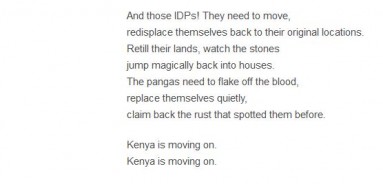I want to re-visit Witness #47, which gets at the core of what, for me, the ICC Witness Project is doing:
The poem begins with the president-elect’s injunction to move on, and when voiced in that voice of authority, “Kenya needs to” becomes an imperative, a command. It’s absurd, of course; moving on seems to literally require moving backwards, like starting a video of an atrocity at the end, and running it backwards to the beginning. [it’s like the joke about listening to country music backwards: you get your dog, your woman, and your job back.]
At the same time, though, let’s look closer at what it means for PEV to un-happen: “needs” become commands.
- "Those who were killed need to undie"
- "women need to guard their wombs"
- "[women need to] erase their memories as they become whole"
- "And those IDPs! They need to move"
The poem expresses the hidden violence of “moving on,” in which all the labor of moving on is placed on the shoulders of the victims, whose responsibility it is to erase themselves as victims. As they “crawl from their graves in solidarity,” in fact, we have a patriotic public duty placed on the victims to not be dead; Kenya needs to stop it, get over it. But the flip side of that absurdity is the way it exacerbates the original violations: not only does the injunction to move on rehearse each of the categories of victim—killed, raped, displaced—reliving the instant of the violation, but it refuses to allow the dead to rest in peace, forcing them to rise from the grave like zombies. Despite the substantive content of the statement “Kenya is moving on,” the form of the poem contradicts that sentiment, which it repeats and reiterates without actually demonstrating.
Previous:
- Reading the ICC Witness Project: About Witness #26 and #47
- Reading the ICC Witness Project: Witness #135
- Reading the ICC Witness Project: Witness #69
- Reading the ICC Witness Project: (un)Witness #20, #22, #34
- Reading the ICC Witness Project: Witness #140
- Reading the ICC Witness Project: Witness #124
- (Some Provisional Writing on) “Time, Poetry, and the ICC Witness Project”

